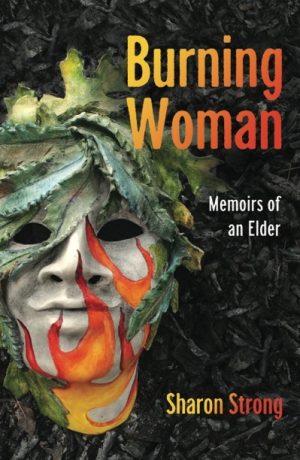Burning Woman
Memoirs of an Elder
Burning Woman is a stimulating artist’s memoir about pursuing personal fulfillment.
Sharon Strong’s Burning Woman is a fascinating memoir about aging and growing into oneself.
Strong, a psychologist and artist, focuses most on the decade between her sixty-fifth and seventy-fifth birthdays, which she calls the the most turbulent period of her life. Her tale starts with a fall, prompting her musings on aging and foreshadowing additional low points in her story. Still, Strong’s process of self-acceptance is the book’s major underlying thread, as becomes apparent in her works of art, including her masks and self portraits—and in the fact that death is a regular subject of hers. As Strong recalls learning the art of mask-making, she notes why it became her primary artistic channel, representing her quest for spiritual authenticity and fulfillment.
Strong also writes about seeking fulfillment through travel and the exploration of cultures around world. She often returns to brief reflections on the purposes and benefits of artistry, pairing these thoughts with memories of her artistic creations and joining her theory ably with her practice. Photographs of the works mentioned in the book help to bridge its two sections, which move at a steady rate through their multiple subjects.
Indeed, the book also touches upon Strong’s childhood, past traumas, and other significant events. Throughout, art becomes a means for Strong understand and process her feelings. A number of romantic partners are mentioned, but her husband is the only one whose life and personality are explained in depth. A filmmaker, his relationship with her becomes central to the continuation of Strong’s story. Still, though he’s credited with being the one man who ever understood her, their relationship is developed with too much speed in the text, and in terms of their immediate feelings of connection via email. The emails themselves wend into the text to support such claims.
But this late, happy turn in the book also leads to a recurrence of childhood traumas: because Strong feels safe with her new partner, and he with her, they decide to face their issues head-on. The book’s accounts of them relieving their trauma are painful, though they also lead to growth. As with Strong’s thoughts on aging, trauma is revealed to be a through-line of the text. The recovery of her traumatic memories leads into provocative reflections on generational trauma and resilience. Nonetheless, the book’s conclusion is both melancholy and joyful.
Centered by thoughts on personal growth, Burning Woman is a stimulating artist’s memoir about pursuing personal fulfillment.
Reviewed by
Carolina Ciucci
Disclosure: This article is not an endorsement, but a review. The publisher of this book provided free copies of the book and paid a small fee to have their book reviewed by a professional reviewer. Foreword Reviews and Clarion Reviews make no guarantee that the publisher will receive a positive review. Foreword Magazine, Inc. is disclosing this in accordance with the Federal Trade Commission’s 16 CFR, Part 255.

